|
|
|
Sort Order |
|
|
|
Items / Page
|
|
|
|
|
|
|
| Srl | Item |
| 1 |
ID:
105977
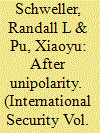

|
|
|
|
|
| Publication |
2011.
|
| Summary/Abstract |
The emerging transition from unipolarity to a more multipolar distribution of global power presents a unique and unappreciated problem that largely explains why, contrary to the expectations of balance of power theory, a counterbalancing reaction to U.S. primacy has not yet taken place. The problem is that, under unipolarity and only unipolarity, balancing is a revisionist, not a status quo, behavior: its purpose is to replace the existing unbalanced unipolar structure with a balance of power system. Thus, any state that seeks to restore a global balance of power will be labeled a revisionist aggressor. To overcome this ideational hurdle to balancing behavior, a rising power must delegitimize the unipole's global authority and order through discursive and cost-imposing practices of resistance that pave the way for the next phase of full-fledged balancing and global contestation. The type of international order that emerges on the other side of the transition out of unipolarity depends on whether the emerging powers assume the role of supporters, spoilers, or shirkers. As the most viable peer competitor to U.S. power, China will play an especially important role in determining the future shape of international politics. At this relatively early stage in its development, however, China does not yet have a fixed blueprint for a new world order. Instead, competing Chinese visions of order map on to various delegitimation strategies and scenarios about how the transition from unipolarity to a restored global balance of power will develop.
|
|
|
|
|
|
|
|
|
|
|
|
|
|
|
|
| 2 |
ID:
077884
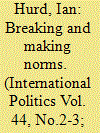

|
|
|
|
|
| Publication |
2007.
|
| Summary/Abstract |
International norms are influential when they are seen as legitimate, and recent American behaviour may undermine the legitimacy of norms on the use of force. I examine three kinds of legitimacy crisis that might arise from American revisionism. First, the US threatens to delegitimate the norms that it challenges, particularly on military preemption. Second, it threatens to undermine its own influence by disassociating American power from one source of legitimation. Finally, it may negate the basic idea of American hegemony as that term is understood in constructivist scholarship and so transform the structure of the international system. Any of these might lead to a crisis, though of different kinds. The American challenge to the customary law on preemption threatens to delegitimize both the existing norms and the social basis of US power, while also attempting to legitimize American interests and new understandings of the norms. It therefore shows the productive and destructive aspects of the power of legitimation in world politics. Legitimation is the link between states and the normative structures of international society
|
|
|
|
|
|
|
|
|
|
|
|
|
|
|
|
| 3 |
ID:
151595
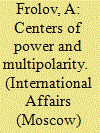

|
|
|
|
|
| Summary/Abstract |
IN 1983, VLADIMIR LUKIN* brought out a book that became a landmark not only for the Institute for the U.S. and Canadian Studies of the Soviet Academy of Sciences, where he worked at that time, but for the entire Soviet scholarly community. It was per se remarkable that the book, entitled Centers of Power: Concepts and Realities, was published at a time when, let me remind you, the Soviet-American confrontation and the rivalry between the two world systems reached their peak and, let's face it, each system professed an ideology that essentially painted a black-and-white picture of the world and claimed to be superior to the other system. Few people could have thought in those days that that state of affairs could come to an end any time soon. The United States was getting ready for a grueling struggle with the Soviets. Almost nobody in either country thought that any third party would ever come forward and throw down the gauntlet to the world's two superpowers. Each system was getting ready for its own historic victory and saw the rest of the world as so many pieces on the chessboard.
|
|
|
|
|
|
|
|
|
|
|
|
|
|
|
|
| 4 |
ID:
191027
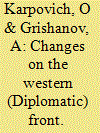

|
|
|
|
|
| Summary/Abstract |
DURING its centuries-old history, Russian diplomacy has addressed many complex, challenging tasks. However, the challenges facing it now are unique and largely existential in nature. The policy of isolating Moscow that Western countries have pursued since the start of the Ukrainian crisis has transformed into a policy of inflicting a "strategic defeat" on our country, by which more and more advocates of this policy mean the disintegration of Russia in its present form.1 As Anatoly Antonov, Russia's ambassador to the US, rightly noted, the question of wiping the Russian state off the world map is being raised.2 Needless to say, preventing this scenario is a key goal of our country's entire state apparatus, especially the Ministry of Foreign Affairs.
In order to successfully stand up to such pressure, we must radically revise the current approach toward diplomacy with the West. Over recent decades, during the post-Soviet period, Russian diplomacy in this area has gone through several phases. At the first stage, in keeping with the political leadership's directives at the time, the essence and concept of the country's foreign policy under the new conditions were clearly formulated, as was its position in dialogue with countries of the collective West. Andrey Kozyrev's famous request for Richard Nixon to explain the essence of Russia's national interests adequately reflected the to-and-fro of...
|
|
|
|
|
|
|
|
|
|
|
|
|
|
|
|
| 5 |
ID:
065945
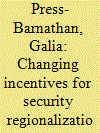

|
|
|
| 6 |
ID:
077212
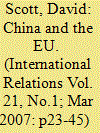

|
|
|
|
|
| Publication |
2007.
|
| Summary/Abstract |
The EU-China relationship is now emerging as a significant feature of the international system. The EU's institutional consolidation, development of supranational trade power and the foreign policy openings of the Common Foreign and Security Policy (CFSP) has entwined with the PRC's ongoing sense of geopolitical manoeuvrings between the superpowers. With its talk of 'multipolarity', grand strategy has converged, though the PRC's stress on 'multipolarity' can perhaps be distinguished from the EU's stress on 'multilateralism'. Nevertheless, human rights issues apart, the EU-China relationship has matured in the last two decades to involve significant economic matters and visions of a wider 'strategic partnership', bringing with it a challenge to American unipolar unilateralism
|
|
|
|
|
|
|
|
|
|
|
|
|
|
|
|
| 7 |
ID:
112423
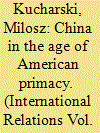

|
|
|
|
|
| Publication |
2012.
|
| Summary/Abstract |
Recent literature on soft balancing predicts an increased occurrence of soft balancing against Washington at times when the United States acts unilaterally in foreign policy. At the same time, realist literature in IR suggests that interest violations should trigger opposition by states whose interests are being violated, unless there are unacceptable costs associated with soft balancing. In contrast to these views, this article demonstrates that interest violation and unilateralism, both individually and together, are weak predictors of soft balancing. Instead, based on the cases analyzed, I argue that soft balancing is most likely to occur when interest violations go hand in hand with perceptions of predatory intentions.
|
|
|
|
|
|
|
|
|
|
|
|
|
|
|
|
| 8 |
ID:
085136
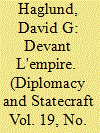

|
|
|
|
|
| Publication |
2008.
|
| Summary/Abstract |
Many observers of contemporary French politics would find it difficult to resist the temptation to conclude that France, alone among the European allies of the United States, has consistently had the greatest difficulty in adjusting to the reality of America's power. When that power occasions, as it frequently does, debates about "American empire," French opposition to American influence seems to become even more pronounced. In fact, there has in recent decades been a distinctive French negative assessment of the merits of American empire, but it would be a mistake, or so this paper argues, to assume that French interests have invariably been at odds either with American power or with American empire. Using four eponymous figures to illustrate the French perspective on American empire in the past 100 years, this essay highlights how and why that assessment has evolved.
|
|
|
|
|
|
|
|
|
|
|
|
|
|
|
|
| 9 |
ID:
106956
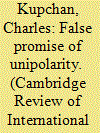

|
|
|
|
|
| Publication |
2011.
|
| Summary/Abstract |
In World out of balance, Stephen Brooks and William Wohlforth make a valuable contribution to ongoing debate about the systemic effects of unipolarity and the durability of US primacy. They are correct that unipolarity engenders systemic stability because the power gap between the United States and potential rivals forestalls military balancing. However, Brooks and Wohlforth underweight other means through which major states are resisting US power and they fail to appreciate that the systemic characteristics of unipolarity may change in relatively short order.
|
|
|
|
|
|
|
|
|
|
|
|
|
|
|
|
| 10 |
ID:
085953
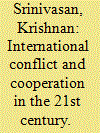

|
|
|
|
|
| Publication |
2009.
|
| Summary/Abstract |
The rise of modern institutional multilateralism is a phenomenon dating back less than a hundred years, and there is no reason to infer that it is either immutable or permanent. With the end of the Cold War, there was an expectation of global consensus and the implementation of collective security. But this depended to an excessive extent on the United States and its willingness to use force, and the level of subjectivity in US-led interventions gave rise to questions of whether multilateralism could survive in conditions of unipolarity. Now the primacy of the United States is slipping, and its pre-eminence will decline as manufacturing, technology and innovation spread. From being the major lending country, it has become the biggest debtor. Despite American military superiority, the world will be increasingly poly-centric and the new emerging powers will exert a strong and increasing influence in world affairs. The character of international cooperation in the next few decades will be shaped by a process by which about half a dozen new major powers seek to mould regional orders of their own. A return to something akin to the 19th-century Concert of Powers seems possible, but this time on a global scale, and with the participation of the emerging strong nations in formal and informal governance structures. The United Nations will continue as a symbol of state sovereignty, and its remit in humanitarian, cultural and developmental good works will be unchallenged, but peace and security decisions at the regional level will be taken by the regional powers on the basis of their self-interest and without reference to the United Nations. Notwithstanding the reasons for the future world order, the existing foundations of security management will not be replaced by anything more reliable, just or legitimate.
|
|
|
|
|
|
|
|
|
|
|
|
|
|
|
|
| 11 |
ID:
086399
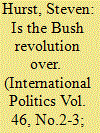

|
|
|
|
|
| Publication |
2009.
|
| Summary/Abstract |
Several observers have argued that the radical transformation of American foreign policy wrought by George W. Bush is already over. They argue that the 'Bush Revolution' was merely a result of the short-term conjuncture of neoconservative influence and the impact of September 11, 2001, and that this temporary deviation has been ended by the American failure in Iraq. Yet the causes of the Bush Revolution are more fundamental and long-term than this argument implies. It is in the combination of the shift to a militarily unipolar international system and the dominance of the Republican Party by its conservative wing that the real roots of the Bush foreign policy lie, and neither condition is likely to alter in the foreseeable future. Moreover, although the Iraq War has led to some shifts in policy, the Republicans' selection of John McCain as their presidential candidate confirms the continued vitality of the Bush Revolution.
|
|
|
|
|
|
|
|
|
|
|
|
|
|
|
|
| 12 |
ID:
085927
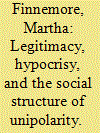

|
|
|
|
|
| Publication |
2009.
|
| Summary/Abstract |
One would think that unipoles have it made.After all, unipolarity is a condition of minimal constraint.Unipoles should be able to do pretty much what they want in the world since, by definition, no other state has the power to stop them.
|
|
|
|
|
|
|
|
|
|
|
|
|
|
|
|
| 13 |
ID:
106953
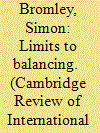

|
|
|
|
|
| Publication |
2011.
|
| Summary/Abstract |
This article explores the major contribution of Brooks and Wohlforth's World out of balance to debate about the role of American primacy and power in contemporary international affairs. It argues that these authors make a major contribution to our understanding of the present international order but that some key questions about the effectiveness of US primacy remain unaddressed and require different questions and considerations to be debated.
|
|
|
|
|
|
|
|
|
|
|
|
|
|
|
|
| 14 |
ID:
106958
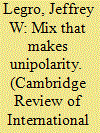

|
|
|
|
|
| Publication |
2011.
|
| Summary/Abstract |
The nature of a global arena dominated by one great power remains a critical subject for understanding international relations. Brooks and Wohlforth's recent book makes an important contribution by arguing that unipolarity poses few constraints to the hegemon and that the United States today should pursue a policy of primacy. The puzzle is that the United States has mostly resisted a primacy policy since becoming the sole superpower, and when it has done so, has often been less successful than the promise of its power advantage. Explaining this puzzle requires building on 'the no constraint' approach to develop a positive theory based on hegemonic purpose, a reformulated notion of constraints, and how purpose and constraints interact to shape outcomes. This reformulation suggests that any American strategy that looks like 'primacy' is unlikely to succeed.
|
|
|
|
|
|
|
|
|
|
|
|
|
|
|
|
| 15 |
ID:
162804
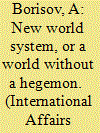

|
|
|
| 16 |
ID:
101207
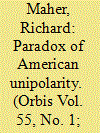

|
|
|
|
|
| Publication |
2010.
|
| Summary/Abstract |
The decline in the United States' relative position is in part a consequence of the burdens and susceptibilities produced by unipolarity. Contrary to the conventional wisdom, the U.S. position both internationally and domestically may actually be strengthened once this period of unipolarity has passed.
|
|
|
|
|
|
|
|
|
|
|
|
|
|
|
|
| 17 |
ID:
077058
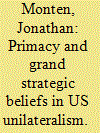

|
|
|
| 18 |
ID:
112633
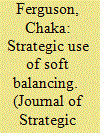

|
|
|
|
|
| Publication |
2012.
|
| Summary/Abstract |
This article examines Chinese and Russian foreign policy and military strategy from the theoretical standpoint of soft balancing. Analysis of their thinking indicates that both seek to offset US military superiority without engaging American power directly. To that end, Chinese and Russian strategists have adopted 'soft' or 'normative' power assets as strategic capabilities in their military and foreign policy. Alternative norms, such as the concept of 'sovereign democracy', allow China and Russia to deliberately ignore human rights issues in order to achieve diplomatic advantage with respect to the United States. The two powers have institutionalized these norms within the Shanghai Cooperation Organization, which they use to counterbalance US interests in Central Asia.
|
|
|
|
|
|
|
|
|
|
|
|
|
|
|
|
| 19 |
ID:
071652
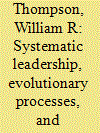

|
|
|
|
|
| Publication |
2006.
|
| Summary/Abstract |
Scholars disagree about the nature of the current international distribution of power and its implications for world politics. Is the current system unipolar, and, if so, is unipolarity likely to persist for very long? Fifteen generalizations about the structure of the international system are culled from the literature and addressed critically from a leadership long cycle point of view. Although the current system is militarily unipolar, it is not buttressed by a new wave of radical technological innovation that is critical to the operation of systemic leadership. Until or unless US military predominance is based on economic predominance, the effects of unipolarity are likely to be relatively weak and probably also short-lived.
|
|
|
|
|
|
|
|
|
|
|
|
|
|
|
|
| 20 |
ID:
077412
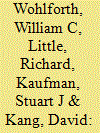

|
|
|
|
|
| Publication |
2007.
|
| Summary/Abstract |
The balance of power is one of the most influential theoretical ideas in international relations, but it has not yet been tested systematically in international systems other than modern Europe and its global successor. This article is the product of a collective and multidisciplinary research effort to redress this deficiency. We report findings from eight new case studies on balancing and balancing failure in different international systems that comprise over 2000 years of international politics. Our findings are inconsistent with any theory that predicts a tendency of international systems toward balance. The factors that best account for variation between balance and hegemony within and across international systems lie outside all recent renditions of balance-of-power theory and indeed, international relations scholarship more generally. Our findings suggest a potentially productive way to reframe research on both the European and contemporary international systems.
|
|
|
|
|
|
|
|
|
|
|
|
|
|
|
|
|
|
|
|
|